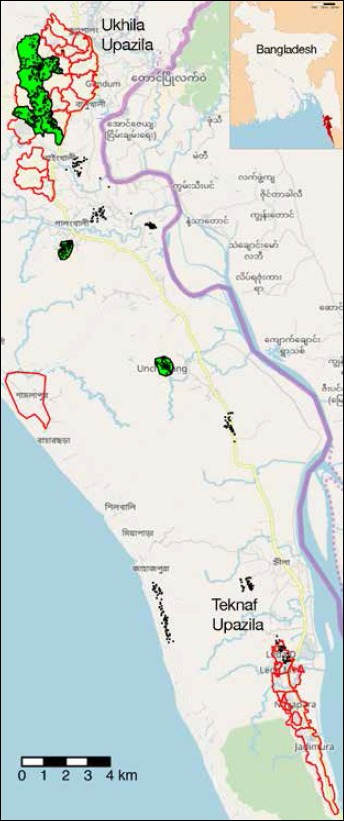About
The genocide of Rohingya people in Myanmar has forced them to flee to Bangladesh, Thailand and other countries, often voluntarily undertaking the perilous journey by boat, or being trafficked. Bangladesh hosts over one million Rohingya refugees, most of whom are now in Cox’s Bazaar, the largest refugee camp in the world. Bangladesh however denies them “formal refugee status,” instead calling them Forcibly Displaced Myanmar Nationals. This was however not always the case.
Rohingya sheltered in Bangladesh prior to 1992 were granted refugee status and were under the purview of UNHCR in formal camp settlements. Those that arrived right after the suspension of refugee status settled nearby in what are now known as “informal camps,” and the penultimate cohort that arrived before the very last influx in 2017, self-settled in the community. These three cohorts present a natural experiment where the differential impact of formal refugee status on the access to education, to work, to sense of belonging and security and to healthcare is stark. We demonstrate this through a survey of 1000 households, and 25 in-depth interviews of Rohingya persons across all three cohorts.
Methods
The study includes a randomized survey of 802 households between March 15 and March 18, 2018, to assess the basic needs, adequacy of services, and priorities among both the Rohingya and local Bangladeshi host communities in Cox’s Bazar, Bangladesh.

Note: Red outlines represent all Rohingya camps, and green represents camps that were sampled from. Black dots represent all sampled households among both the Rohingya and host communities.
The study was conducted in the Rohingya makeshift camps located in the Ukhia and Teknaf subdistricts of Cox’s Bazar, and among host community households located within a five-kilometer radius of these camps. The researchers surveyed 402 Rohingya households and 400 host community households. The sample size was powered to detect differences within each group at the 95% significance level; the study’s sample size calculation assumed a conservative proportion estimate of 50%, with a 5% margin of error. “Household” in this context is defined as a person or group of persons who live together. Each survey was administered to one adult respondent (over 18 years of age) per household, after obtaining that person’s consent.
Publications
The Rohingya in Cox’s Bazar: When the Stateless Seek Refuge
Abhishek Bhatia, Ayesha Mahmud, Arlan Fuller, Rebecca Shin, Azad Rahman, Tanvir Shatil, Mahmuda Sultana, K. A. M Morshed, Jennifer Leaning, and Satchit Balsari
Health and Human Rights Journal